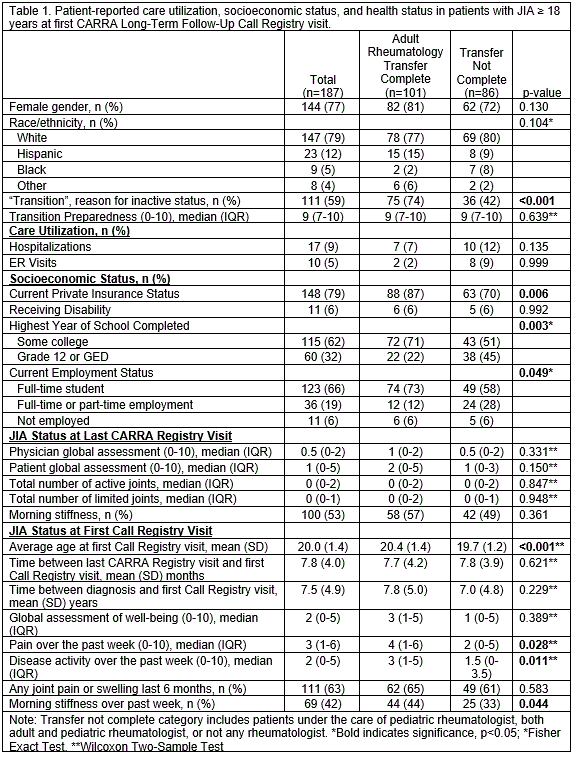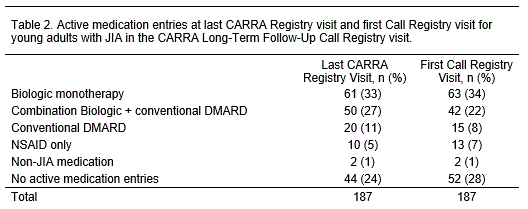Session Information
Date: Tuesday, November 9, 2021
Title: Pediatric Rheumatology – Clinical Poster III: Miscellaneous Rheumatic Disease (1614–1644)
Session Type: Poster Session D
Session Time: 8:30AM-10:30AM
Background/Purpose: Young adulthood is a vulnerable period for individuals with childhood-onset rheumatic diseases, especially the transition from pediatric to adult care. Our objective was to determine patterns in patient-reported care utilization, socioeconomic status, and health status among young adults with juvenile idiopathic arthritis (JIA), including factors associated with completed transfer to adult rheumatology.
Methods: We analyzed prospectively collected observational data from the Childhood Arthritis and Rheumatology Research Alliance (CARRA) JIA Registry. Enrollment began in 2015, collecting clinical information from pediatric rheumatology centers every 6 months. After a 6-month period of Registry inactive status, patients are automatically enrolled in the Long-Term Follow-Up Call Registry which collects patient-reported information via phone surveys every 6 months. We included patients in the Call Registry with JIA who were ≥18 years old at their first Call visit. We extracted available demographic, care utilization, and socioeconomic and health status data from each patient’s last CARRA Registry visit and first Call Registry visit. We compared characteristics of patients who completed transfer to adult rheumatology care to those who did not.
Results: Of 187 young adults in the Call Registry, 101 (54%) had completed transfer to an adult rheumatologist, 30 (16%) reported still being under the care of a pediatric rheumatologist, 9 (5%) were under the care of both an adult and pediatric rheumatologist, and 56 (30%) were not under the care of any rheumatologist. “Transition” was the most common reason for inactive CARRA Registry status and was more likely for those who completed transfer compared to those who did not, though there was no difference in reported transition preparedness between groups (Table 1). Transferred patients were more likely to have private insurance, have completed some college, be full-time students, and were older at first Call visit compared to those who had not completed transfer. JIA disease activity at the last CARRA Registry visit was not associated with transfer to adult care. Biologic medication use was high at both visits (Table 2) and did not differ by transfer status. However, 63% reported problems with pain/discomfort and 44% with anxiety/depression using the EQ-5D generic health status scale (Figure 1). Patients who completed transfer to adult rheumatology reported higher pain scores, higher self-assessed disease activity, and more morning stiffness compared to those who did complete transfer.
Conclusion: Young adult respondents with JIA commonly report problems in the pain and anxiety/depression domains of health-related quality of life. There was persistent high use of biologic medications, and those who completed transfer to adult rheumatology had higher pain and self-reported disease activity than those who did not, despite high levels of perceived transition preparedness. Additional work is needed to understand how best to address comorbid pain and anxiety/depression during the peri-transition period. Care of young adults with childhood-onset rheumatic disease entering adult care should include efforts to minimize the impact of these comorbidities.
 Figure 1. Reported problems in health-related quality of life (EQ-5D domains) among young adults with JIA in the CARRA Long-Term Follow-Up Call Registry.
Figure 1. Reported problems in health-related quality of life (EQ-5D domains) among young adults with JIA in the CARRA Long-Term Follow-Up Call Registry.
To cite this abstract in AMA style:
Smitherman E, Chahine R, Bitencourt N, Rahman A, Lawson E, Chang J. Patient-Reported Care Utilization, Socioeconomic Status, and Health Status Among Young Adults with JIA [abstract]. Arthritis Rheumatol. 2021; 73 (suppl 9). https://acrabstracts.org/abstract/patient-reported-care-utilization-socioeconomic-status-and-health-status-among-young-adults-with-jia/. Accessed .« Back to ACR Convergence 2021
ACR Meeting Abstracts - https://acrabstracts.org/abstract/patient-reported-care-utilization-socioeconomic-status-and-health-status-among-young-adults-with-jia/


